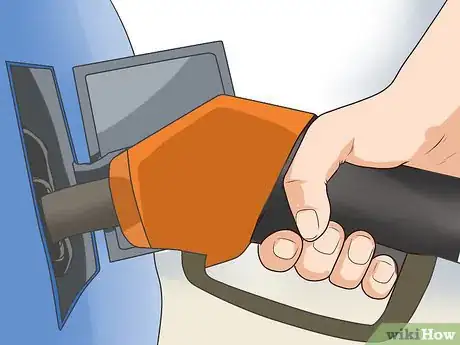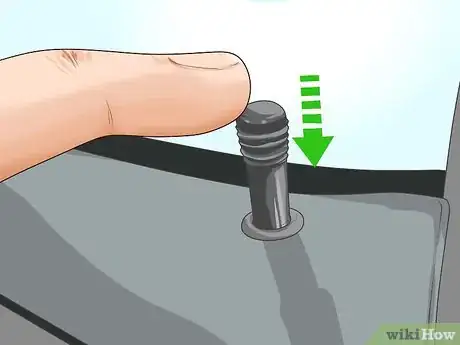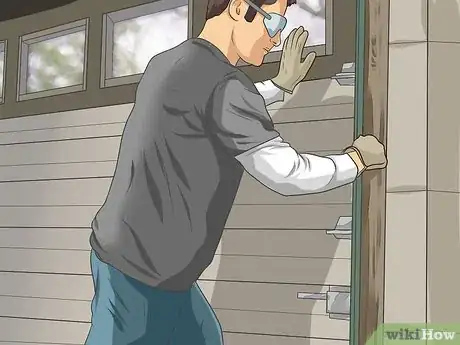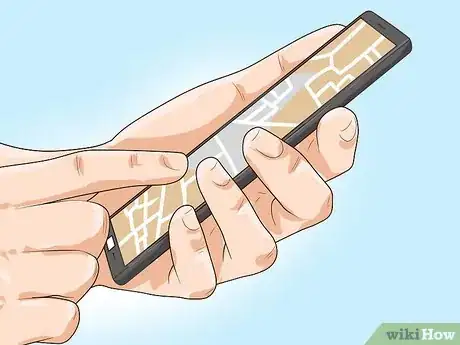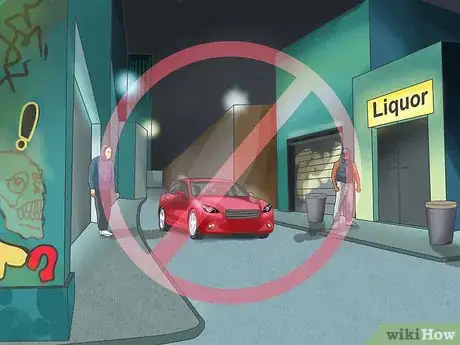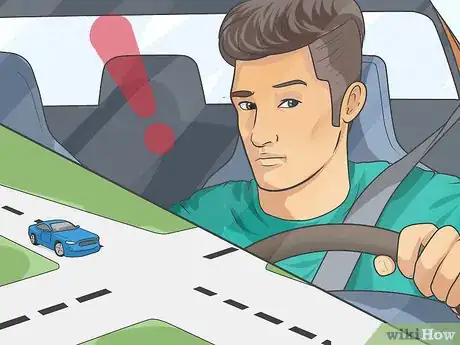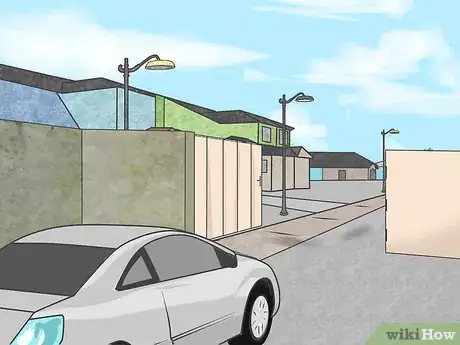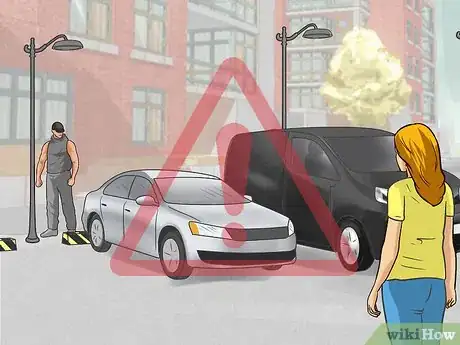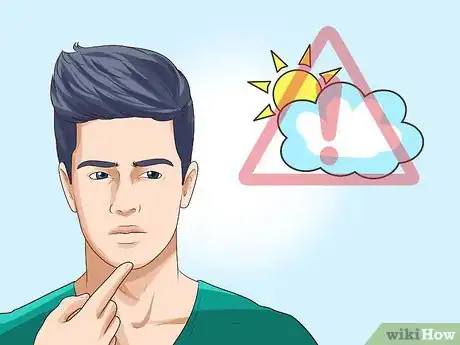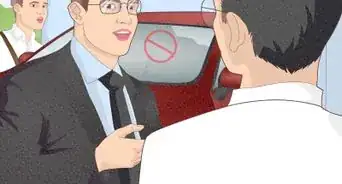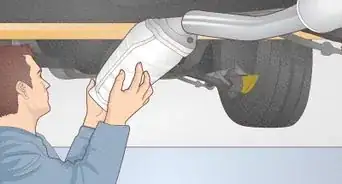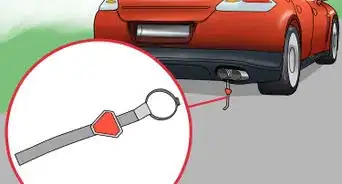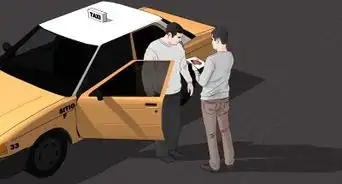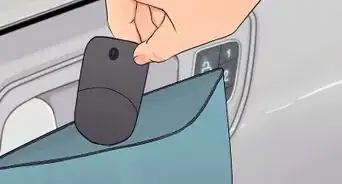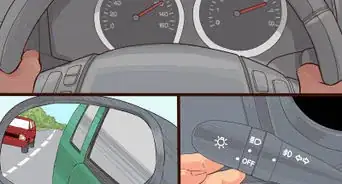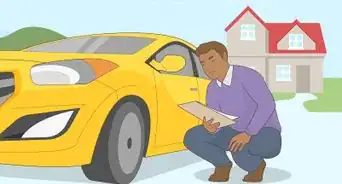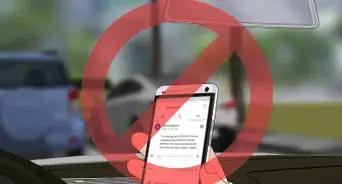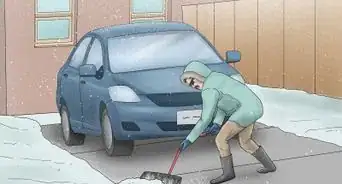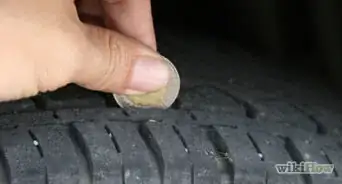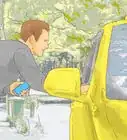This article was co-authored by Saul Jaeger, MS. Saul Jaeger is a Police Officer and Captain of the Mountain View, California Police Department (MVPD). Saul has over 17 years of experience as a patrol officer, field training officer, traffic officer, detective, hostage negotiator, and as the traffic unit’s sergeant and Public Information Officer for the MVPD. At the MVPD, in addition to commanding the Field Operations Division, Saul has also led the Communications Center (dispatch) and the Crisis Negotiation Team. He earned an MS in Emergency Services Management from the California State University, Long Beach in 2008 and a BS in Administration of Justice from the University of Phoenix in 2006. He also earned a Corporate Innovation LEAD Certificate from the Stanford University Graduate School of Business in 2018.
There are 17 references cited in this article, which can be found at the bottom of the page.
wikiHow marks an article as reader-approved once it receives enough positive feedback. In this case, 89% of readers who voted found the article helpful, earning it our reader-approved status.
This article has been viewed 132,255 times.
Carjacking occurs when someone steals a motor vehicle from another person by use of force or intimidation.[1] Victims of carjacking can be kidnapped, injured, and even killed.[2] The best way to protect yourself from this scenario is to always stay alert and be aware of your surroundings.[3] Prevention is key, so learn safety tips before anything bad has a chance to happen!
Steps
Keeping Your Car Safe
-
1Keep your car tuned up and full of gas. "E" does not stand for “Enough to get me where I need to go.” Keep your car full of gas and in good working condition. If your car is not tuned up and breaks down, it can make you a sitting duck for carjackers.[4]
- Check your tires once a month and before you take a trip. Look for wear, damage, or low air.[5]
-
2Lock your car doors and keep the windows up. This applies whether you are in your car or not. Make it part of your driving ritual to lock your doors as soon as you get into the car, and as soon as you get out.[6]Advertisement
-
3Don’t leave valuables in sight inside your car.[7] If you must keep personal property such as a purse or shopping bags in the vehicle, put them in the trunk where they can’t be seen. Never leave money in view inside your car, even if it’s just spare change.[8]
- While driving, put valuable items on the floor rather than on the seats. They will be less visible in case you need to stop and for some reason can’t put them in the trunk.
-
4Know your neighbors.[9] Knowing your neighbors will help you recognize if there is a suspicious vehicle or individual around.[10] If you see an unfamiliar person loitering or a strange vehicle repeatedly cruising in the neighborhood, this is considered a “suspicious activity.” Don’t go home. Report the activity to local police and drive around the block; come back to your driveway when that person has left.[11]
- Reporting suspicious activity and unusual events or incidents to the authorities can reduce crime and make your community safer.
-
5Keep the driveway well-lit and unobstructed.[12] Make sure that your driveway and garage have lighting. Don’t keep shrubs or other heavy foliage around your driveway.[13] Keep your driveway lit with traditional ground lighting, solar lighting, hanging lights, or LED lighting along the length of your driveway.[14]
- If you live in an area with foggy nights, choose lighting that can be seen without decreasing visibility in fog.
- Ground lights should be at least a foot apart and staggered somewhat.
-
6Keep your car in a locked garage.[15] If possible, keep your car parked in your garage and lock the garage door.[16] Having an automatic garage door closed does not necessarily make it thief-proof. Carjackers “fish” garage doors with wire hooks to activate the release mechanisms of automatic garage doors.[17]
- Block access to the release mechanism inside your garage by making a shield with a piece of plywood fastened to a wood cleat with two brad nails. You can also lock the release mechanism with a twist-tie.
- You can use a t-handle or slide lock on your garage door as an extra safety measure. A t-handle lock uses its own key and a slide lock can be used with a padlock.
-
7Be careful when warming up your car in cold weather. If you need to warm up your car in the wintertime, have a second set of keys so that you can keep the car locked while it’s idling. Carjackers use unlocked, running cars as opportunities to steal vehicles.[18]
Planning Ahead
-
1Plan your routes. Decide on your route before you depart on your trip, even if it’s just across town. Asking for directions can tip off a would-be carjacker that you are lost and/or not paying attention to your surroundings. Plan ahead of time which route you will take and any stops you may need to make along the way.[19]
- Choose the most direct routes possible, and mix up your routine so that you are not a predictable target for criminals.[20]
-
2Avoid trouble spots and driving in unfamiliar areas. Avoid high crime areas, rural areas with less populated roads, and congested traffic spots.[21] Look for a navigation app with the safety feature of avoiding high crime spots.[22] If you notice a lot of cars in disrepair, graffiti, liquor stores, check-cashing stores, or tire skid marks on the street, you may be in a bad neighborhood.[23]
-
3Take extra care when parking in commercial areas. According to the National Crime Victimization survey, 25% of all carjackings happen in parking lots, parking garages or near commercial areas. Park in a spot close to the building’s main entrance and under a lot of light,[24] avoiding areas that are visually obstructed by walls or large plants.[25] Don’t sit in the car and go through receipts or have a conversation on the phone or with your child in the backseat. Get in, lock the doors and go.
- Don’t put your seatbelt on while pulling out of a space. If something happens, you may need to get out of your car quickly. Instead, belt yourself as soon as you are out of the space and ready to drive.[26]
- In parking garages, park close to the exit and back into the space. It’s easier to drive forwards than backwards in an emergency.[27]
-
4Have a cell phone or radio communication on you at all times. Keep a GPS system in your car or a GPS app on your phone in case you get lost.[28] Always have a charged cell phone with you. Even if it is not under a service contract, you can still use it to call 911 if necessary. Just keep in mind that if you do not have a wireless provider and your call with an emergency operator gets disconnected, you will have to call back because they cannot call you.[29]
Staying Alert
-
1Check your mirrors for anyone possibly following you. If you think you are being followed, make false turns. If the driver behind you continues to pursue, go to your nearest police station.[30]
-
2Stay alert at intersections. Stay in the center lane when possible. Don’t turn your attention to a cell phone or radio. Observe 360 degrees around you through your mirrors and windows.[31] Keep distance between your car and the one in front of you. This enables you to get around the car in front of you if it stalls or if someone suspicious approaches your car.[32]
- Keep about one-half of the length of your vehicle between you and the vehicle ahead of you, so that you can maneuver out if necessary. As a rule of thumb, you should be able to see the rear tires of the vehicle ahead of you.
-
3Know how to react if your car is bumped from behind. Carjackers use a ruse called “The Bump.” They rear-end cars and steal them when the drivers get out to assess the damage and gather information. If your car gets hit from behind, only pull over and get out when you reach a safe, public place.[33]
- Stay inside your vehicle with the doors locked and windows shut. Signal to the other driver to follow you and drive to the nearest police or fire station. If you see that the other driver is not following you, take note of their license plate number.[34]
-
4Don’t get out of the car if something is under your windshield wiper. Placing paper money (real or fake) or even fliers under your windshield wiper is a trick criminals can use to get you out of your car. If you see money on your windshield and exit your vehicle to grab it, a carjacker can rush into your vehicle and actually run you over as well as steal your car.[35]
-
5Be wary of people trying to get your attention. Carjackers try to take advantage of people’s empathy by creating ruses. If someone is flashing their lights and trying to wave you over to the side of the road, or is appearing to be injured from an accident and is soliciting your attention, don’t stop.[36]
- If someone was trying to signal that there is a problem with your vehicle, keep driving and pull over when you find a safe public place.
- If someone appeared to be injured and needed help, call the authorities or go to your nearest police or fire station to tell them what you saw.
-
6Avoid surveillance traps in gated communities. Most attempted or successful carjackings happen within 5 miles of the victim’s place of residence.[37] Carjackers may surveil cars returning to gating communities and trap you in before the gate opens. If you’re returning home to your own residence, wait on the street until the gate is opened if necessary, so that a car cannot pull up behind you and trap you in.[38]
- If you are visiting someone else’s gated community, call ahead to have the gate opened.
-
7Look, listen, and trust your instincts when approaching your car. Keep your head up, ears open, and eyes peeled when you’re returning to your car. Don’t ignore your gut feeling if you sense that something is wrong. If you see someone standing around in the parking lot, or you merely sense something is not right, don’t proceed to your car. Return to a place where people are and ask for a security escort to walk you to your car. If that is not possible, wait for a group of people and walk with them.[39] 92% of carjackings happen to victims who are alone.[40]
- Look under, around and inside your car.[41]
- Don’t allow children or packages to distract from your alertness. Make it a habit to look around before putting anything or anyone into the car.
-
8Don’t stop at isolated phones or money machines. If you must stop at a drive-thru ATM, have your ATM card ready, keep your car in drive, and pull up as close to the ATM as possible. Check your rearview mirror before stopping.[42]
- Avoid isolated payphones, newspaper machines and parking lots.
-
9Don’t disregard safety because it’s daytime. Not all carjackings happen under the cloak of night. In fact, more than half (64%) of daytime carjacking attempts are successful.[43] Be as alert during the daylight as you would be at nighttime.
Expert Q&A
-
QuestionHow can I keep my car safe?
 Saul Jaeger, MSSaul Jaeger is a Police Officer and Captain of the Mountain View, California Police Department (MVPD). Saul has over 17 years of experience as a patrol officer, field training officer, traffic officer, detective, hostage negotiator, and as the traffic unit’s sergeant and Public Information Officer for the MVPD. At the MVPD, in addition to commanding the Field Operations Division, Saul has also led the Communications Center (dispatch) and the Crisis Negotiation Team. He earned an MS in Emergency Services Management from the California State University, Long Beach in 2008 and a BS in Administration of Justice from the University of Phoenix in 2006. He also earned a Corporate Innovation LEAD Certificate from the Stanford University Graduate School of Business in 2018.
Saul Jaeger, MSSaul Jaeger is a Police Officer and Captain of the Mountain View, California Police Department (MVPD). Saul has over 17 years of experience as a patrol officer, field training officer, traffic officer, detective, hostage negotiator, and as the traffic unit’s sergeant and Public Information Officer for the MVPD. At the MVPD, in addition to commanding the Field Operations Division, Saul has also led the Communications Center (dispatch) and the Crisis Negotiation Team. He earned an MS in Emergency Services Management from the California State University, Long Beach in 2008 and a BS in Administration of Justice from the University of Phoenix in 2006. He also earned a Corporate Innovation LEAD Certificate from the Stanford University Graduate School of Business in 2018.
Police Captain, Mountain View Police Department When you can, park your car in a locked garage so it's harder for thieves to access it. If you can't do that, make sure you don't keep any valuables in your car since it could tempt others.
When you can, park your car in a locked garage so it's harder for thieves to access it. If you can't do that, make sure you don't keep any valuables in your car since it could tempt others.
References
- ↑ http://www.thefreedictionary.com/carjacked
- ↑ https://crimedoctor.com/carjacking-facts/
- ↑ https://2009-2017.state.gov/m/ds/rls/rpt/19782.htm
- ↑ http://www.dailysun.co.za/SunDefender/ways-to-avoid-getting-carjacked-20160918
- ↑ http://www.michelinman.com/US/en/safe-driving/tire-safety/inspection.html
- ↑ http://www.nola.com/crime/index.ssf/2013/06/nopd_crime_prevention_how_to_a.html
- ↑ Saul Jaeger, MS. Police Captain, Mountain View Police Department. Expert Interview. 21 February 2020.
- ↑ http://www.iii.org/article/preventing-carjacking-theft
- ↑ Saul Jaeger, MS. Police Captain, Mountain View Police Department. Expert Interview. 21 February 2020.
- ↑ http://www.dailysun.co.za/SunDefender/ways-to-avoid-getting-carjacked-20160918
- ↑ https://www.bja.gov/Publications/NSA_NW_Manual.pdf
- ↑ Saul Jaeger, MS. Police Captain, Mountain View Police Department. Expert Interview. 21 February 2020.
- ↑ http://www.dailysun.co.za/SunDefender/ways-to-avoid-getting-carjacked-20160918
- ↑ http://homeguides.sfgate.com/lighting-solutions-long-driveway-20786.html
- ↑ Saul Jaeger, MS. Police Captain, Mountain View Police Department. Expert Interview. 21 February 2020.
- ↑ http://www.iii.org/article/preventing-carjacking-theft
- ↑ http://www.familyhandyman.com/garage/garage-security-tips/view-all
- ↑ http://abcnews.go.com/US/avoid-survive-carjacked/story?id=28284468
- ↑ http://www.nola.com/crime/index.ssf/2013/06/nopd_crime_prevention_how_to_a.html
- ↑ http://www.dailysun.co.za/SunDefender/ways-to-avoid-getting-carjacked-20160918
- ↑ https://2009-2017.state.gov/m/ds/rls/rpt/19782.htm
- ↑ http://www.dailymail.co.uk/sciencetech/article-3647262/Commuters-avoid-crime-hotspots-Waze-app-route-drivers-high-risk-areas.html
- ↑ http://www.californiadriving.com/basics-crime/
- ↑ http://abcnews.go.com/US/avoid-survive-carjacked/story?id=28284468
- ↑ https://crimedoctor.com/carjacking-facts/
- ↑ http://www.aware.org/resources/legal-articles/8-content/185-foiling-a-carjacking-by-lyn-bates
- ↑ http://abcnews.go.com/US/avoid-survive-carjacked/story?id=28284468
- ↑ https://2009-2017.state.gov/m/ds/rls/rpt/19782.htm
- ↑ https://www.fcc.gov/consumers/guides/911-wireless-services
- ↑ http://www.dailysun.co.za/SunDefender/ways-to-avoid-getting-carjacked-20160918
- ↑ http://www.getyourdrivers.co.za/the-test/cars-and-trucks/yard-test?showall=&start=3
- ↑ https://2009-2017.state.gov/m/ds/rls/rpt/19782.htm
- ↑ https://2009-2017.state.gov/m/ds/rls/rpt/19782.htm
- ↑ http://www.nola.com/crime/index.ssf/2013/06/nopd_crime_prevention_how_to_a.html
- ↑ http://abcnews.go.com/US/avoid-survive-carjacked/story?id=28284468
- ↑ https://2009-2017.state.gov/m/ds/rls/rpt/19782.htm
- ↑ https://crimedoctor.com/carjacking-facts/
- ↑ https://2009-2017.state.gov/m/ds/rls/rpt/19782.htm
- ↑ http://www.aware.org/resources/legal-articles/8-content/185-foiling-a-carjacking-by-lyn-bates
- ↑ https://crimedoctor.com/carjacking-facts/
- ↑ https://crimedoctor.com/carjacking-facts/
- ↑ http://abcnews.go.com/US/avoid-survive-carjacked/story?id=28284468
- ↑ https://crimedoctor.com/carjacking-facts/
